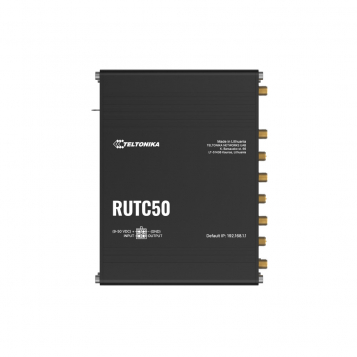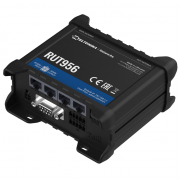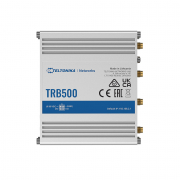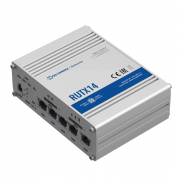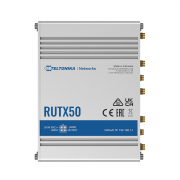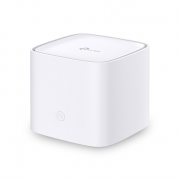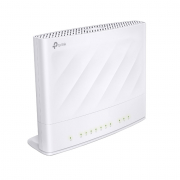Teltonika Cellular 5G Mobile Router - RUTC50
Teltonika RUTC50
£641.99
Availability: Despatched next working day
Linitx Quick Code # 17982
![]()
Manufacturer SKU: RUTC50
Manufacturer: Teltonika Networks
 ||||
||||Teltonika RUTC50 Cellular 5G Mobile Router
At a Glance:
- 5G - Ultra-high cellular speeds of up to 3.4 Gbps
- WiFi 6 for 2402 Mbps
- Dual SIM: Auto-failover, backup WAN, and other switching scenarios
- Backward compatible with 4G (LTE Cat 20)
- Up to 500 simultaneous connections
- 1 x WAN port 10/100/1000 Mbps
- 4 x Ethernet ports, 10/100/1000 Mbps
- Compliance with IEEE 802.3, IEEE 802.3u, 802.3az standards
- Supports auto MDI/MDIX crossover
Introducing the Teltonika RUTC50, a versatile 5G router designed for high-speed, reliable connectivity. The device supports 5G, 4G LTE, and 3G networks, ensuring optimal performance even in demanding environments.
The RUTC50 is equipped with advanced carrier aggregation, and offers ultra-fast data speeds and low latency, perfect for bandwidth-intensive applications. The RUTM50 features dual SIM for uninterrupted connection, multiple Gigabit Ethernet ports, and WiFi 6 support for superior wireless performance.
With built-in GPS, extensive VPN options, and remote management capabilities via Teltonika’s RMS, the RUTC50 is ideal for industrial, IoT, and enterprise applications, providing secure and stable network solutions.
Mobile module
5G Sub-6Ghz SA/NSA 2.4/3.4G bps DL (4x4 MIMO), 900/550 Mbps UL (2x2); 4G (LTE) – LTE Cat 20 2.0 Gbps DL, 210Mbps UL; 3G – 42 Mbps DL, 5.76 Mbps U
SIM switch
2 SIM cards, auto-switch cases: weak signal, data limit, SMS limit, roaming, no network, network denied, data connection fail, SIM idle protection
Status
IMSI, ICCID, operator, operator state, data connection state, network type, CA indicator, bandwidth, connected band, signal strength (RSSI), SINR, RSRP, RSRQ, EC/IO, RSCP, data sent/received, LAC, TAC, cell ID, ARFCN, UARFCN, EARFCN, MCC, and MNC
SMS
SMS status, SMS configuration, send/read SMS via HTTP POST/GET, EMAIL to SMS, SMS to EMAIL, SMS to HTTP, SMS to SMS, scheduled SMS, SMS autoreply, SMPP
USSD
Supports sending and reading Unstructured Supplementary Service Data messages
Black/White list
Operator black/white list (by country or separate operators)
Multiple PDN
Possibility to use different PDNs for multiple network access and services
Band management
Band lock, Used band status display
SIM idle protection service
When working with devices with two SIM slots, the one not currently in use will remain idle until the device switches to it, meaning that no data is used on the card until then
APN
Auto APN
Bridge
Direct connection (bridge) between mobile ISP and device on LAN
Passthrough
Router assigns its mobile WAN IP address to another device on LAN
Framed routing
Framed routing: support an IP network behind 5G UE
Wireless mode
802.11b/g/n/ac/ax (Wi-Fi 6) with data transmission rates up to 2402Mbps on 5GHz, 576Mbps on 2.4GHz (Dual Band, MU-MIMO)
Wi-Fi security
WPA2-Enterprise - PEAP, WPA2-PSK, WPA-EAP, WPA-PSK, WPA3-SAE, WPA3-EAP, OWE; AES-CCMP, TKIP, Auto-cipher modes, client separation, EAP-TLS with PKCS#12 certificates, disable auto-reconnect
SSID/ESSID
ESSID stealth mode
Wi-Fi users
Up to 512 simultaneous connections
Wireless Connectivity Features
Wireless mesh (802.11s), fast roaming (802.11r), Relayd, BSS transition management (802.11v), radio resource measurement (802.11k)
Wireless MAC filter
Whitelist, blacklist
Wireless QR code generator
Once scanned, a user will automatically enter your network without needing to input login information.
WAN
1 x WAN port 10/100/1000 Mbps, compliance with IEEE 802.3, IEEE 802.3u, 802.3az standards, supports auto MDI/MDIX crossover
LAN
4 x ETH ports, 10/100/1000 Mbps, supports auto MDI/MDIX crossover
Routing
Static routing, Dynamic routing (BGP, OSPF v2, RIP v1/v2, EIGRP, NHRP), Policy based routing
Network protocols
TCP, UDP, IPv4, IPv6, ICMP, NTP, DNS, HTTP, HTTPS, FTP, SMTP, SSL v3, TLS, ARP, VRRP, PPP, PPPoE, UPNP, SSH, DHCP, Telnet, SMPP, SNMP, MQTT, Wake On Lan (WOL)
VoIP passthrough support
H.323 and SIP-alg protocol NAT helpers, allowing proper routing of VoIP packets
Connection monitoring
Ping Reboot, Wget Reboot, Periodic Reboot, LCP and ICMP for link inspection
Firewall
Port forward, traffic rules, custom rules
Firewall status page
View all your Firewall statistics, rules, and rule counters
Ports management
View device ports, enable and disable each of them, turn auto-configuration on or off, change their transmission speed, and so on
Network topology
Visual representation of your network, showing which devices are connected to which other devices
Hotspot
Captive portal (hotspot), internal/external Radius server, Radius MAC authentication, SMS authorisation, internal/external landing page, walled garden, user scripts, URL parameters, user groups, individual user or group limitations, user management, 9 default customisable themes and optionality to upload and download customised hotspot themes
DHCP
Static and dynamic IP allocation, DHCP relay, DHCP server configuration, status, static leases: MAC with wildcards
QoS / Smart Queue Management (SQM)
Traffic priority queuing by source/destination, service, protocol or port, WMM, 802.11e
DDNS
Supported >25 service providers, others can be configured manually
Network backup
Wi-Fi WAN, Mobile, VRRP, Wired options, each of which can be used as an automatic Failover
Load balancing
Balance Internet traffic over multiple WAN connections
SSHFS
Possibility to mount remote file system via SSH protocol
VRF support
Initial virtual routing and forwarding (VRF) support
Authentication
Pre-shared key, digital certificates, X.509 certificates, TACACS+, Radius, IP & login attempts block, time-based login blocking, built-in random password generator
Firewall
Pre-configured firewall rules can be enabled via WebUI, unlimited firewall configuration via CLI; DMZ; NAT; NAT-T
Attack prevention
DDOS prevention (SYN flood protection, SSH attack prevention, HTTP/HTTPS attack prevention), port scan prevention (SYN-FIN, SYN-RST, X-mas, NULL flags, FIN scan attacks)
VLAN
Port and tag-based VLAN separation
Mobile quota control
Mobile data limit, customizable period, start time, warning limit, phone number
WEB filter
Blacklist for blocking out unwanted websites, Whitelist for specifying allowed sites only
Access control
Flexible access control of SSH, Web interface, CLI and Telnet
OpenVPN
Multiple clients and a server can run simultaneously, 27 encryption methods
OpenVPN Encryption
DES-CBC 64, RC2-CBC 128, DES-EDE-CBC 128, DES-EDE3-CBC 192, DESX-CBC 192,
BF-CBC 128, RC2-40-CBC 40, CAST5-CBC 128, RC2-64-CBC 64, AES-128-CBC 128, AES-128-CFB 128, AES-128-CFB1 128, AES-128-CFB8 128, AES-128-OFB 128, AES-128-GCM 128, AES-192-CFB 192, AES-192-CFB1 192, AES-192-CFB8 192, AES-192-OFB 192, AES-192-CBC 192, AES-192-GCM 192, AES-256-GCM 256, AES-256-CFB 256, AES-256-CFB1 256, AES-256-CFB8 256, AES-256-OFB 256, AES-256-CBC 256
IPsec
IKEv1, IKEv2, with 14 encryption methods for IPsec (3DES, DES, AES128, AES192, AES256, AES128GCM8, AES192GCM8, AES256GCM8, AES128GCM12, AES192GCM12, AES256GCM12, AES128GCM16, AES192GCM16, AES256GCM16)
GRE
GRE tunnel, GRE tunnel over IPsec support
PPTP, L2TP
Client/Server instances can run simultaneously, L2TPv3, L2TP over IPsec support
Stunnel
Proxy designed to add TLS encryption functionality to existing clients and servers without any changes in the program’s code
DMVPN
Method of building scalable IPsec VPNs
SSTP
SSTP client instance support
ZeroTier
ZeroTier VPN client support
WireGuard
WireGuard VPN client and server support
Tinc
Tinc offers encryption, authentication and compression in it's tunnels. Client and server support.
Tailscale
Tailscale offers speed, stability, and simplicity over traditional VPNs. Encrypted point-to-point connections using the open source WireGuard protocol
Supported modes
Client, Server
Supported connection types
TCP
Supported modes
Server, Client
Supported connection types
TCP, USB
Custom registers
MODBUS TCP custom register block requests, which read/write to a file inside the router, and can be used to extend MODBUS TCP Client functionality
Supported data formats
8-bit: INT, UINT; 16-bit: INT, UINT (MSB or LSB first); 32-bit: float, INT, UINT (ABCD (big-endian), DCBA (little-endian), CDAB, BADC), HEX, ASCII
Protocol
HTTP(S), MQTT, Azure MQTT
Data to server
Extract parameters from multiple sources and different protocols, and send them all to a single server
Modbus MQTT Gateway
Allows sending commands and receiving data from MODBUS Server through MQTT broker
Supported modes
Station, Outstation
Supported connection
TCP, USB
DLMS Support
DLMS - standard protocol for utility meter data exchange
WEB UI
HTTP/HTTPS, status, configuration, FW update, CLI, troubleshoot, multiple event log servers, firmware update availability notifications, event log, system log, kernel log, Internet status
FOTA
Firmware update from server, automatic notification
SSH
SSH (v1, v2)
SMS
SMS status, SMS configuration, send/read SMS via HTTP POST/GET
Call
Reboot, Status, Mobile data on/off, Output on/off, answer/hang-up with a timer, Wi-Fi on/off
TR-069
OpenACS, EasyCwmp, ACSLite, tGem, LibreACS, GenieACS, FreeACS, LibCWMP, Friendly tech, AVSystem
MQTT
MQTT Broker, MQTT publisher
SNMP
SNMP (v1, v2, v3), SNMP Trap
JSON-RPC
Management API over HTTP/HTTPS
RMS
Teltonika Remote Management System (RMS)
Cloud of Things
Allows monitoring of: Device data, Mobile data, Network info, Availability
ThingWorx
Allows monitoring of: WAN Type, WAN IP, Mobile Operator Name, Mobile Signal Strength, Mobile Network Type
Cumulocity
Allows monitoring of: Device Model, Revision and Serial Number, Mobile Cell ID, ICCID, IMEI, Connection Type, Operator, Signal Strength, WAN Type and IP
Azure IoT Hub
Can send device IP, Number of bytes send/received, Temperature, PIN count to Azure IoT Hub server, Mobile connection state, Network link state, IMEI, ICCID, Model, Manufacturer, Serial, Revision, IMSI, SIM State, PIN state, GSM signal, WCDMA RSCP, WCDMA EC, IO, LTE RSRP, LTE SINR, LTE RSRQ, CELL ID, Operator, Operator number, Connection type, Temperature, PIN count to Azure IoT Hub server
CPU
MediaTek, Dual-Core, 880 MHz, MIPS1004Kc
RAM
256 MB, DDR3
FLASH storage
16MB serial NOR flash, 256MB serial NAND flash
WEB UI
Update FW from file, check FW on server, configuration profiles, configuration backup
FOTA
Update FW
RMS
Update FW/configuration for multiple devices at once
Keep settings
Update FW without losing current configuration
Factory settings reset
A full factory reset restores all system settings, including the IP address, PIN, and user data to the default manufacturer's configuration
Operating system
RutOS (OpenWrt based Linux OS)
Supported languages
Busybox shell, Lua, C, C++, and Python, Java in Package manager
Development tools
SDK package with build environment provided
GPL customization
You can create your own custom, branded firmware and web page application by changing colours, logos, and other elements in our firmware to fit your or your clients’ needs
GNSS
GPS, GLONASS, BeiDou, Galileo and QZSS
Coordinates
GNSS coordinates via WebUI, SMS, TAVL, RMS
NMEA
NMEA 0183
NTRIP
NTRIP protocol (Networked Transport of RTCM via Internet Protocol)
Server software
Supported server software TAVL, RMS
Geofencing
Configurable multiple geofence zones
Data rate
USB 2.0
Applications
Samba share, USB-to-serial
External devices
Possibility to connect external HDD, flash drive, additional modem, printer, USB-serial adapter
Storage formats
FAT, FAT32, exFAT, NTFS (read-only), ext2, ext3, ext4
Input
1 x Digital Input, 0 - 6 V detected as logic low, 8 - 50 V detected as logic high
Output
1 x Digital Output, Open collector output, max output 50 V, 300 mA
Events
Email, RMS, SMS
I/O juggler
Allows to set certain I/O conditions to initiate event
Connector
4-pin industrial DC power socket
Input voltage range
9 – 50 VDC, reverse polarity protection, surge protection >51 VDC 10us max
Power consumption
Idle: <5 W, Max: <18 W
Ethernet
5 x RJ45 ports, 10/100/1000 Mbps
I/O’s
1 x Digital Input, 1 x Digital Output on 4-pin power connector
Status LEDs
3 x connection status LEDs, 3 x connection strength LEDs, 10 x Ethernet port status LEDs, 4 x WAN status LEDs, 1 x Power LED, 2 x 2.4G and 5G Wi-Fi LEDs
SIM
2 x SIM slots (Mini SIM – 2FF), 1.8 V/3 V
Power
1 x 4-pin power connector
Antennas
4 x SMA for Mobile, 2 x RP-SMA for Wi-Fi, 1 x SMA for GNNS
USB
1 x USB A port for external devices
Reset
Reboot/User default reset/Factory reset button
Other
1 x Grounding screw
Casing material
Aluminium housing
Dimensions (W x H x D)
132 x 44.2 x 95.1 mm
Weight
519 g
Mounting options
DIN rail, wall mount, flat surface (all require additional kit)
Operating temperature
-40 °C to 75 °C
Operating humidity
10% to 90% non-condensing
Ingress Protection Rating
IP30
Regulatory
FCC, IC, PTCRB, UL/CSA Safety, NOM
Operator
T-Mobile, AT&T (FirstNet)
Standards
47 CFR Part 15 Subpart B
ICES-003: Issue 7 (October 2020)
Standards (Wi-Fi 2.4 GHz, 5 GHz)
47 CFR Part 15 Subpart C - § 15.247, Subpart E - § 15.407
RSS-247 Issue 2 (February 2017), RSS-Gen Issue 5 (April 2018) Amendment 2 (February 2021)
KDB 905462 D02 UNII DFS Compliance Procedures New Rules v02
KDB 905462 D04 Operational Modes for DFS Testing New Rules v01
Standards (4G, 5G)
47 CFR Part 2, Part 22 Subpart H, Part 24 Subpart E, Part 27 Subpart C, Part 90 Subpart R/S, Part 96
RSS-130 Issue 2 (February 2019), RSS-132 Issue 3 (January 2013), RSS-133 Issue 6 (January 2018) Amendment, RSS-139 Issue 3 (July 2015), RSS-140 Issue 1 (April 2018), RSS-192 Issue 4 (May 2020), RSS-195 Issue 2 (April 2014), RSS-197 Issue 1 (February 2010), RSS-199 Issue 3 (December 2016), RSS-Gen Issue 5 (April 2018) Amendment 2
SRSP-503 Issue 7 (September 2008), SRSP-510 Issue 5 (February 2009), SRSP-513 Issue 3 (July 2015), SRSP-516 Issue 1 (April 2014), SRSP-517 Issue 1 (July 2014), SRSP-518 Issue 2 (February 2019), SRSP-520 Issue 2 (November 2021)
Standards
47 CFR - § 2.1091
KDB 447498 D04 Interim General RF Exposure Guidance v01
RSS-102 Issue 5 (March 2015) Amendment 1
Standards
UL/CSA Safety: UL 62368-1 (3rd Ed., Rev. December 13, 2019), C22.2 No. 62368-1:19 (3rd Ed., Rev. December 13, 2019)
Box Contents:
- RUTC50 Router
- 18 W UK PSU
- 4 x Mobile antennas (swivel, SMA male)
- 2 x Wi-Fi antennas (magnetic mount, RP-SMA male, 1.5 m cable)
- 1 x GNSS antenna (adhesive, SMA male, 3 m cable)
- Ethernet cable (1.5 m)
- SIM Adapter kit
- QSG (Quick Start Guide)
Please note that links to other websites are beyond our control. We link in good faith and are not be responsible for their content.

 £ GBP
£ GBP € EUR
€ EUR $ USD
$ USD
